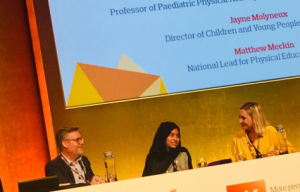Dr Kathryn Woods-Townsend, programme manager for LifeLab and member of the ukactive Kids Council, joined hundreds of other delegates for the ukactive National Summit event where the call to action was very clear.
This week saw more than 700 decision makers and influencers gather at the QEII Centre in London with one thing in mind – to get the UK more active.
The ukactive National Summit saw the launch of their latest report. Alongside a report on healthy aging was the publication of Generation Inactive 2.0, which painted a worrying picture of what our future could be if we did not address the health and fitness of younger generations.
Latest statistics revealed how just one in four boys and one in five girls in England do the recommended 60 minutes of activity each day while figures from Ofcom report that children aged five to 15 spend nearly two hours a day online during the week and nearly three hours a day at the weekend.
But the mood in the room was one of conviction – we can do something about raising inactivity levels with a united and determined multi-agency effort.
A very clear message also came out of the day – we should be doing less of telling young people what to do, and more of listening to them if we are going to find a solution. The theme of the report: ‘Nothing about us, without us’ resonated throughout the event.
The call to action came from all political sides, from all ages and from all organisations committed to improving the health of the nation.
The summit included some impassioned speakers; from Baroness Tanni Grey Thompson urging the government to include physical activity at policy level, to Tom Watson MP describing his remarkable weight loss and reversal of Type 2 diabetes through diet and exercise. But none were more inspiring than student Rahela who made the very clear point; young people need to have a voice – involve us, don’t lecture us.

She urged people in the room to consider how they deal with young people spending too much time on a screen. “Don’t try to stop screen time, but use technology to our advantage.” That really struck a chord with the team from LifeLab as that is the precise approach being adopted for the EACH-B project.
The project, funded by the National Institutes of Health Research, is currently developing an application to run on mobile devices that combines digital platforms to improve the health of younger generations. EACH-B was also praised in the Generation Inactive 2.0 report, for how it was attempting to capitalise on the increasing use of digital technology by younger people and use it to sustain engagement in activity and fitness.
Delegates came away from the day incredibly inspired to redouble efforts in making change happen. There was a feeling of momentum too as we look ahead to National Fitness Day on 26 September, as a real chance for the country to get behind an initiative that will shine a light on just how important getting active is to the health of our generation and those to come.